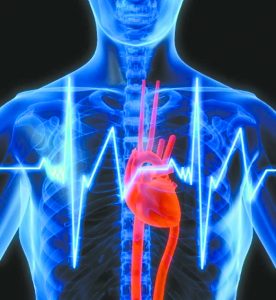 High blood sugar and cardiovascular disease have more in common than most people are aware. In our country nearly 30 million people have diabetes, and a vast majority of our population unknowingly has what’s known as prediabetes, which quickly escalates into the disease within a short amount of time.
High blood sugar and cardiovascular disease have more in common than most people are aware. In our country nearly 30 million people have diabetes, and a vast majority of our population unknowingly has what’s known as prediabetes, which quickly escalates into the disease within a short amount of time.
The heart and the issue of high blood glucose are very closely associated because of many risk factors contributing to what’s known as metabolic syndrome.
Metabolic syndrome is a condition in which the high insulin and leptin levels are resistant causing high blood pressure, high cholesterol, high triglycerides and visceral fat to become significant risk factors for heart disease and coronary disorders.
Insulin is a hormone that helps move sugar into the blood for energy, in the case of an insulin resistant person, they have too much sugar, and the body cannot adequately utilize the source. This leads to weight gain, obesity, and subsequently, a more sedentary lifestyle. Leptin is a hormone that helps regulate body weight by sending signals to the hypothalamus in the brain. When the signals are damaged, the body becomes leptin resistant, and a person may often feel extremely hungry and irritable, which contributes to a vicious cycle of overeating foods that are high in sugar and unhealthy fats.
In recent years, metabolic syndrome has become a commonly identified risk factor for cardiovascular disease because a vast amount of Americans are overweight and their bodies become inflamed; this inflammatory response affects their vascular structures. When the vessels are circulating high-glucose blood, atherosclerosis occurs at a greater intensity. Atherosclerosis is a build-up of plaque and causes a hardening of the arteries.
Unfortunately, Sugar has become a major staple in the American diet. The normal fasting blood sugar levels should be around 70-99 mg/dl. The normal A1C, which measures the blood glucose level, should be below 5.7%. With diabetes and even prediabetes, these levels are at an unhealthy height and can be very hard to lower without a major intervention with medication, exercise, dietary changes and a lifestyle overhaul.
Once you have metabolic syndrome, you must lose weight, lower your lipid levels, and reduce hypertension and combat stress. At this point, merely lowering your blood glucose is not enough. This is precisely the reason why so many people with diabetes that reduce their blood sugar, still are at high risk for cardiac episodes.
Metabolic Syndrome Affects
• High Lipid Counts
• Being Overweight
• Poor Diet (Sugar Cravings)
• Visceral fat
• Abdominal fat
• High blood pressure
• Lack of exercise
If you have diabetes, it’s critical that you see a cardiologist because it’s not a matter of, “Will I have heart issues”, but rather when?
Dr. Vallabhan
Rolling Oaks Professional Park
929 N US HWY 441, Suite 201
Lady Lake, FL 32159
352.750.2040
Tags featured
Check Also
Revolutionizing Neuropathy Treatment: The Summus Laser Approach at LaserLab
Neuropathy, a condition affecting an estimated 42.5 million Americans, can significantly impact one’s quality of …
 Central Florida Health and Wellness Magazine Health and Wellness Articles of the Villages
Central Florida Health and Wellness Magazine Health and Wellness Articles of the Villages



